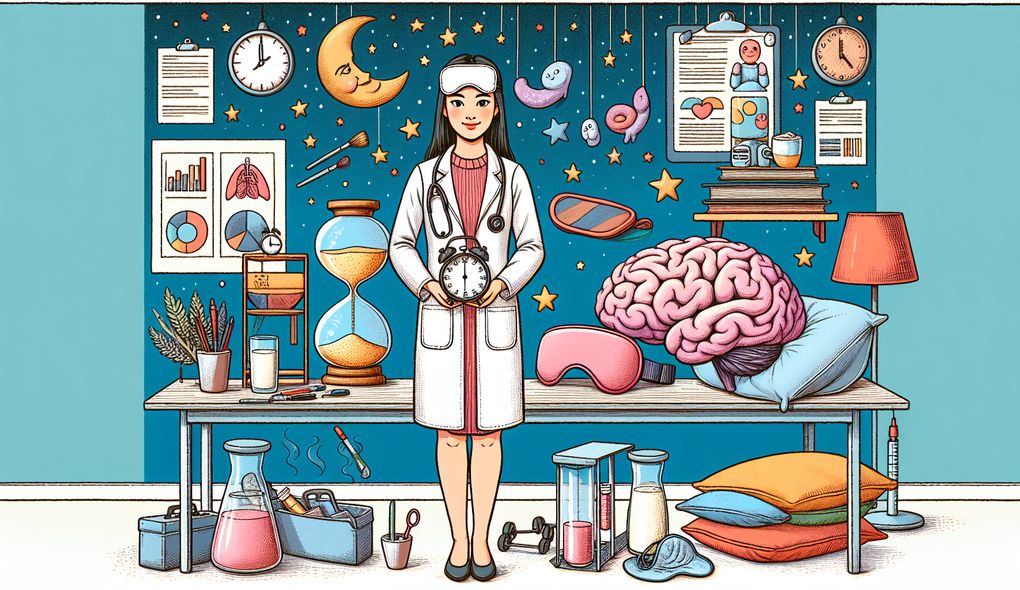How would you approach diagnosing sleep disorders based on sleep study results?
JUNIOR LEVEL

Sample answer to the question:
To diagnose sleep disorders based on sleep study results, I would first carefully review the patient's medical history and any symptoms they are experiencing. I would then thoroughly analyze the sleep study data, paying close attention to the various parameters such as EEG, EOG, EMG, and respiratory events. By interpreting these findings, I would be able to identify any abnormalities or patterns that suggest a specific sleep disorder. Additionally, I would consider the patient's lifestyle and any relevant risk factors. Based on my diagnosis, I would develop an individualized treatment plan tailored to the patient’s needs and preferences. Throughout the process, I would ensure effective communication with the patient and provide education about sleep health and hygiene to promote long-term well-being.
Here is a more solid answer:
To effectively diagnose sleep disorders based on sleep study results, I would begin by meticulously reviewing the patient's medical history, focusing on any relevant symptoms or underlying conditions. This initial step helps me gain a comprehensive understanding of the patient's health status. Next, I would carefully analyze the sleep study data, paying close attention to parameters such as electroencephalography (EEG), electrooculography (EOG), electromyography (EMG), and respiratory events. By expertly interpreting these findings, I can identify any abnormalities or patterns indicative of specific sleep disorders. Additionally, I would take into account the patient's lifestyle, occupation, and relevant risk factors to further inform my diagnosis. Collaboration is crucial in sleep medicine, so I would work closely with other healthcare professionals, such as pulmonologists or neurologists, to ensure a comprehensive evaluation. Moreover, I am dedicated to continuous learning and staying up-to-date with the latest research and advancements in sleep medicine. This commitment allows me to provide the best possible care to my patients.
Why is this a more solid answer?
The solid answer provides more specific details on how the candidate approaches diagnosing sleep disorders based on sleep study results. It addresses all the evaluation areas mentioned in the job description and emphasizes the candidate's commitment to continued medical education. However, the answer could still be further improved by adding more examples or specific techniques related to interpreting sleep study data and collaborating in a multidisciplinary team.
An example of a exceptional answer:
When approaching the diagnosis of sleep disorders based on sleep study results, I follow a comprehensive and patient-centered approach. Firstly, I conduct a thorough review of the patient's medical history, paying attention to any pre-existing conditions, medications, or lifestyle factors that may contribute to sleep disturbances. I then meticulously analyze sleep study data, meticulously examining parameters like EEG, EOG, EMG, and respiratory events. I utilize advanced knowledge and cutting-edge research to interpret these findings accurately, identifying subtle abnormalities and patterns. To ensure the highest quality of care, I collaborate closely with other sleep medicine specialists, pulmonologists, neurologists, and psychologists in a multidisciplinary team. Through collective expertise, we develop innovative treatment plans tailored to each patient's unique needs and preferences. In addition to my current knowledge, I am committed to continuous educational growth. I actively engage in conferences, read scientific literature, and participate in workshops to stay up-to-date with the latest advancements in sleep medicine. By integrating the most recent research into my practice, I strive to provide the highest level of care to my patients, ultimately improving their sleep quality and overall well-being.
Why is this an exceptional answer?
The exceptional answer demonstrates a highly detailed and patient-centered approach to diagnosing sleep disorders based on sleep study results. It includes specific techniques, such as utilizing advanced knowledge and cutting-edge research, and highlights the candidate's commitment to continuous education and integration of the latest research into their practice. The answer is comprehensive and provides a thorough understanding of the candidate's expertise in sleep medicine.
How to prepare for this question:
- Familiarize yourself with common sleep disorders and their diagnostic criteria, such as sleep apnea, insomnia, narcolepsy, and restless legs syndrome.
- Stay updated with the latest advancements in sleep medicine by regularly reading scientific literature and attending conferences.
- Develop strong analytical and problem-solving skills by practicing the interpretation of sleep study data.
- Enhance your ability to work collaboratively in a multidisciplinary team by seeking opportunities to collaborate with other healthcare professionals, both within and outside your specific field.
- Demonstrate your commitment to continued medical education by participating in relevant workshops, webinars, or online courses specifically focused on sleep medicine.
- Improve your communication and interpersonal skills by actively engaging with patients, explaining complex medical concepts in an accessible manner, and providing education on sleep health and hygiene.
What are interviewers evaluating with this question?
- Analytical and problem-solving skills
- Interpretation of sleep study data
- Collaboration in a multidisciplinary team
- Commitment to continued medical education

